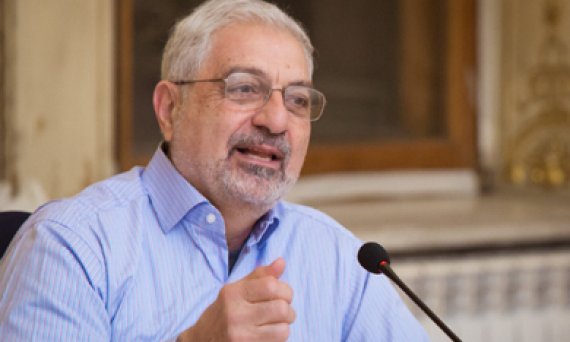On December 17th, prominent American historian Ronald Suny gave a presentation.
In 1991, after the collapse of the Soviet Union and the subsequent radical economic reforms and the attempt to establish democracy, new forms of resistance to the West began to form in Russia. These new forms opposed Western hegemony in two ways: by proclaiming the need for an alternative to capitalism on the one hand, and democracy on the other. Resistance to Western hegemony now finds support throughout the world, and is embodied in various forms of fundamentalism, anti-modernism and traditionalism, which can all be found in Russia. After the collapse of the Soviet Union, the Cold War was replaced by new forms of opposition against the West.
In the Soviet Union, there existed a primitive understanding of Marxism. A crude version of it was practiced as its critical components were eliminated, and after the fall of the USSR, Marxism moved underground. Marxism includes a critical standpoint that is directed against hegemony, and provides a notion of the common good that differs from what exists in the West. Russia, having virtually eliminated the Leftist spectrum of political preferences in the 1990s, opened the path for the expansion of traditionalism and conservatism.
The 20th century saw the rise of two utopias: the utopia of equal political rights, and the utopia of economic equality. But the social and political spheres must reintegrate into the common good: the communist experiment showed that socialism cannot exist without democracy, and American reality has revealed that democracy cannot exist without socialism. In a capitalist society economic inequality can adversely effect political competition — a candidate can bribe the media, for example. As a result there is a risk that policies will exist not in the interest of common good, but rather for the sake of interest groups.
In contemporary world several processes are unfolding in parallel. One is an increase in the level of economic inequality, both inter- and intra- nationally. People and economies are being exploited within the framework of capitalism. Market relationships are used in solving both economic and social problems. But reality has shown that capitalism is not a panacea against all diseases. It was at first widely believed that capitalism led to democracy, but it turns out that capitalism can coexist with authoritarian and oligarchic regimes equally successfully. The concentration of political power and economic resources in one hands leads to authoritarianism, which in turns increases the resistance movements that are often fundamentalist in nature. It is this aspect of capitalism’s influence that should be taken into consideration in the United States.
The United States has positioned itself as a conductor of capitalism in other countries. The government’s political elite views democracy as an inevitable outcome of capitalism, and also perceives a symbiosis of capitalism and democracy as a guarantee of peace. But America’s role looks a bit different in the global system: in promoting capitalism, it establishes its own hegemony. Certain nations, such as Syria, China, Iran, Venezuela, and Russia, resist this. If in the 1990s the United States established such a hegemony, then now its policies have lead to battles between the West and non-West. Where Russia is concerned, this resistance became especially apparent in 2008, in Georgia, and in 2014, in Ukraine. Ronald Suny interprets these events as Russia’s resistance to American attempts at establishing Western hegemony at its own borders.
The fact is that Russia, with its relatively weak military (it spends several times less on arms than the United States), is not trying to achieve imperial control in the region, but is rather trying to challenge Western hegemony in neighboring territories. If before 2008 Russia used soft power in order to prevent the expansion of Western influence in the region, then 2008 proved to be a turning point after which Russia began to use military power.
Professor Suny identifies six stages of Russian policy associated with an attempt to stop the expansion of Western hegemony at its borders and to establish its own supremacy there:
In 1991-1992, Yeltsin conducted a policy of ignoring Russia’s own nearby neighbors while the country searched for its new identity and formed its own internal political interests.
In 1993 through June of 1996, Russia declared its right to defend the countries that had agreed to reintegrate into the Commonwealth of Independent States (CIS). In Central Asia, Russia began a policy of defending national minorities.
From June 1996 until the arrival of Putin, Russia used the rhetoric of “pragmatic hegemony,” “great power,” and “sovereignty.”
From 1999 until 2004 there were attempts to reintegrate the CIS countries, and Russia tried to expand its own hegemony in the region. At roughly this time the United States actively supported revolution in Serbia in 2000, in Georgia in 2003, and in Ukraine and Kyrgyzstan in 2004 and 2005, respectively.
In 2007 Vladimir Putin gave his famous speech that became a prologue to the new “cold” war. At that time, he said the United States was the dominating sovereign, the single center of force and decision-making in the world. Russia began to openly resist this hegemony by exercising its veto power in the UN. External politics at the time reflected internal politics, and discourse was dominated by “stability,” “continuity,” and “strong leadership.” A democratic façade was established in Russia.
Since 2008 Russia hasn’t tried to establish imperial control over other nations, but it has used both soft and military power to resist Western hegemony. The United States is trying to strengthen its own supremacy through liberal intervention, not allowing Russia and China to change the situation. Furthermore, the United States possesses vast military strength that Russia, China and other countries are trying to emulate, which has lead to their militarization and ongoing confrontation.
Sofya Lopatina










